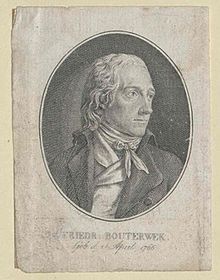Friedrich Ludewig Bouterweck
Friedrich Ludewig Bouterweck , also Friedrich Bouterwek (born April 15, 1766 in Oker , † August 9, 1828 in Göttingen ), was a German philosopher and writer.
Life
Bouterweck was the son of Friedrich Ferdinand Butterweck , the director of a mine in Oker.
At the University of Goettingen studied Bouterweck Jura and philology under Professor Christian Gottlob Heyne and Johann Georg Heinrich Feder . Influenced by friends and also by reading the works of Friedrich Schiller and Jean-Jacques Rousseau , Bouterweck soon switched to literature and writing. Nevertheless, he successfully completed his law degree.
Under the pseudonym Ferdinand Adrianov he debuted in the Muse almanacs of Gottfried August Bürger . After completing his studies, he got a job at the Higher Appeal Court in Hanover . Supported by Johann Wilhelm Gleim , Bouterweck was given easier access to various literary circles in Berlin .
In 1789 Bouterweck settled in Göttingen as a private lecturer and initially taught history. Later he dealt with the philosophy of Immanuel Kant , whom he also got to know personally during that time. In 1797 Bouterweck was named ao. Prof. (from 1802 full professor ) appointed to succeed his teacher Feder.
In the years 1801 to 1819 Bouterweck's story of poetry and eloquence was written . This work is still considered to be one of the last truly universal achievements in literary history. Bouterweck spoke about aesthetics in his philosophical lectures every winter semester . In the discussion between Immanuel Kant and Baruch Spinoza , Bouterweck represented a rather moderate rationalism.
Influenced by Friedrich Heinrich Jacobi , Bouterweck's philosophical realism turned into a system of virtualism . Here, it seems, Bouterweck had a great influence on Arthur Schopenhauer , who was his pupil in Göttingen.
Since 1808 he was a foreign member of the Bavarian Academy of Sciences . In 1810 he was elected a full member of the Göttingen Academy of Sciences and in 1812 a corresponding member of the Prussian Academy of Sciences .
In 1806 Bouterweck married Sophie Julie Westfeld in Weende near Göttingen. With her he had three daughters and two sons. The history painter Friedrich Bouterweck was his nephew.
His wife died in Göttingen in 1826 at the age of 54. Two years later, Friedrich Ludewig Bouterweck died at the age of 62 on August 9, 1828 in Göttingen.
Works (selection)
- Aesthetics (1806)
- History of poetry and eloquence since the end of the 13th century (1.1801–12.1819)
- Count Donamar (1791-1793)
- Ideas for a general apodictic (1799)
- The religion of reason. Ideas for Accelerating the Progress of a Sustainable Philosophy of Religion (1824)
literature
- Leo Knop: Friedrich Bouterweck as a playwright and novelist . Dissertation, University of Greifswald 1912.
- Gustav Struck : Friedrich Bouterwek. His life, his writings and his philosophical teachings . C. Hinstorff, Rostock 1919 (also dissertation, University of Rostock, 1917; award document awarded by the University of Rostock).
- Ernst Henke: Bouterwek, Friedrich . In: Allgemeine Deutsche Biographie (ADB). Volume 3, Duncker & Humblot, Leipzig 1876, pp. 213-216.
- Hermann Zeltner : Bouterweck, Friedrich Ludewig. In: New German Biography (NDB). Volume 2, Duncker & Humblot, Berlin 1955, ISBN 3-428-00183-4 , p. 492 f. ( Digitized version ).
Web links
- Literature by and about Friedrich Ludewig Bouterweck in the catalog of the German National Library
- Works by and about Friedrich Ludewig Bouterweck in the German Digital Library
Individual evidence
- ^ Wilhelm Ebel : Catalogus Professorum Gottingensium 1734-1962 . Göttingen 1962. p. 122 and p. 106.
- ↑ member entry by Friedrich Bouterweck at the Bavarian Academy of Sciences , accessed December 26, 2016th
- ↑ Holger Krahnke: The members of the Academy of Sciences in Göttingen 1751-2001 (= Treatises of the Academy of Sciences in Göttingen, Philological-Historical Class. Volume 3, Vol. 246 = Treatises of the Academy of Sciences in Göttingen, Mathematical-Physical Class. Episode 3, vol. 50). Vandenhoeck & Ruprecht, Göttingen 2001, ISBN 3-525-82516-1 , p. 47.
- ^ Members of the previous academies. Friedrich Ludewig Bouterwek. Berlin-Brandenburg Academy of Sciences , accessed on February 27, 2015 .
| personal data | |
|---|---|
| SURNAME | Bouterweck, Friedrich Ludewig |
| ALTERNATIVE NAMES | Adrianow, Ferdinand (pseudonym); Bouterwek, Friedrich |
| BRIEF DESCRIPTION | German philosopher and writer |
| DATE OF BIRTH | April 15, 1766 |
| PLACE OF BIRTH | Oker am Harz |
| DATE OF DEATH | August 9, 1828 |
| Place of death | Goettingen |

